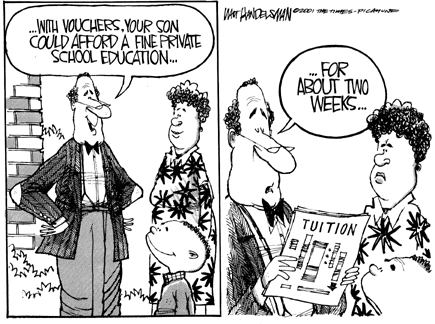Private School Choice Programs Are Growing and Can Complicate Providing Certain Federally Funded Services to Eligible Students

Participation in voucher and education savings account (ESA) programs, which fund private school tuition and other educational expenses, has more than doubled in the past 5 years, and available information about the characteristics of participating students varies. From school years 2010-11 through 2014-15, the number of students participating in these private school choice programs—which are regarded as an alternative to public schools—grew from approximately 70,000 to 147,000. During that time period, funds provided for students also increased substantially, from approximately $400 million to $859 million, according to GAO's survey of all voucher programs and ESA programs operating in 2015 and related follow-up. This growth reflects both creation of new programs and expansion of existing ones. GAO's survey also found that student eligibility is often based on their disability status or family income. However, the information programs have about student characteristics varies and cannot be compared across all programs because of differing data collection methods or definitions for characteristics like race and ethnicity, disability status, and income.
Voucher and ESA programs generally placed some requirements on participating private schools, according to GAO's review of program documents, survey responses, and interviews with program officials. For example, in GAO's survey, 18 of 20 voucher programs and one of two operating ESAs reported that teachers must meet minimum education requirements, such as having a bachelor's degree. Similarly, 17 voucher programs and one ESA reported requiring schools to measure student performance, for example, with the same tests required for public school students. Fewer private school choice programs reported that they restrict the admissions criteria schools may use for private school choice students. Private school officials GAO interviewed identified students' disciplinary or academic history as common admissions considerations.
Federal laws and regulations for two key federal education grant programs require public school districts to provide “equitable services,” which may include speech therapy or reading tutors, to eligible private school students, and the Department of Education (Education) provides general guidance on these requirements. However, Education's guidance does not specifically address providing these services to students participating in private school choice programs. Education officials said they had not received any recent inquiries on the subject, but officials in all four states GAO visited—comprising half of all private choice programs and two-thirds of participating students—said that vouchers and ESAs complicate their efforts to implement these requirements. Further, although Education officials said that a student's participation in private school choice programs does not affect the federal equitable services requirements, officials GAO spoke to in two states expressed confusion about whether a student's participation in these programs changed their eligibility for these services. Providing quality information to clarify requirements and responsibilities—including adapting to emerging trends—is a key federal internal control. Providing such information would help clarify how to implement equitable services requirements in the context of growing private school choice programs.
Why GAO Did This Study
Voucher and ESA programs fund students' private school education expenses, such as tuition. In school year 2014-15, 22 such school choice programs were operating nationwide, all but one of which was state funded. Under two federal grant programs, one for students with disabilities and one for students from disadvantaged areas, districts are required to spend a proportionate amount of their federal funds to provide equitable services for eligible private school students, and this population includes eligible students in private school choice programs. GAO was asked to review these topics.
This report examines 1) participation in private school choice programs and the characteristics of students, 2) program requirements for participating private schools, and 3) how Education supports districts' efforts to deliver these federally funded services in the context of school choice programs. GAO reviewed relevant federal laws and regulations, surveyed all voucher and ESA programs as of fall 2015, and interviewed Education officials and other stakeholders. GAO also reviewed documents and interviewed state, public school district, and private school officials in a nongeneralizable sample of 10 private school choice programs in four states, selected to include programs with large enrollment and a range of eligibility criteria.
What GAO Recommends
GAO recommends Education include in its guidance information about providing equitable services in the context of private school choice programs. Education agreed with our recommendation.
For more information, contact Jacqueline M. Nowicki at (617) 788-0580 or nowickij@gao.gov.
U.S. GAO - School Choice: Private School Choice Programs Are Growing and Can Complicate Providing Certain Federally Funded Services to Eligible Students:Additional Materials:
- Highlights Page:
- Full Report:
- Accessible Version:
